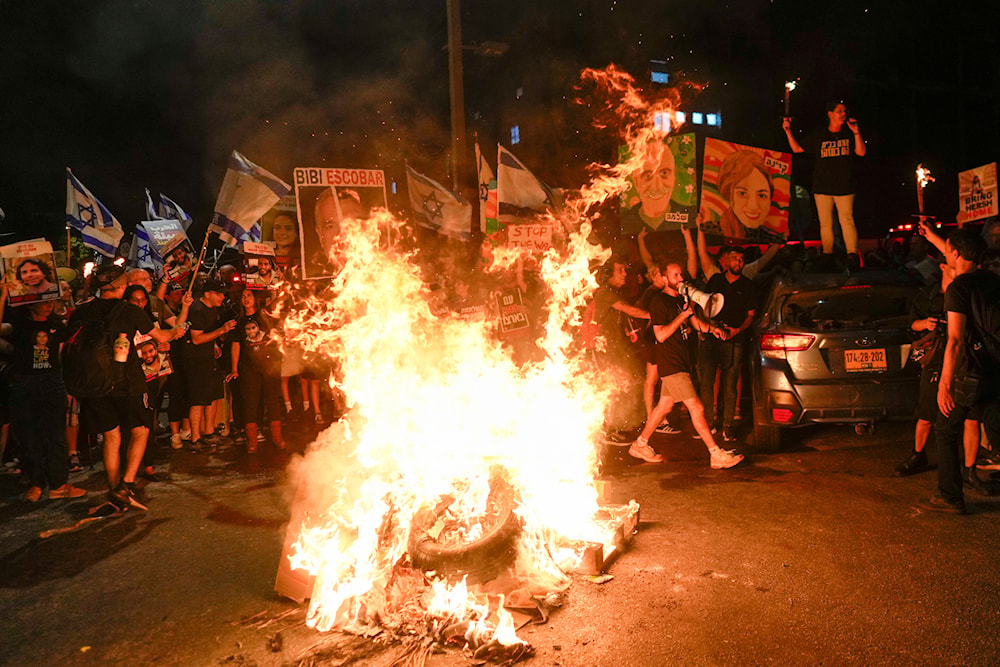Southern Israeli settlers do not trust cabinet handling of war
Israeli settlers in southern occupied Palestine lack trust in their government's handling of the war, with many deciding not to go back to their settlements.
-

Israeli settlers protest against Israeli Prime Minister Benjamin Netanyahu's government and call for the release of captives held in the Gaza Strip in Tel Aviv, occupied Palestine, June 29, 2024 (AP)
A report by Israeli Channel 12 on Thursday revealed that settlers in the southern regions of occupied Palestine are expressing a deep distrust in the management of the ongoing war and the prospects for a lasting ceasefire in its wake.
A Channel 12 anchor, daily air raid sirens have been heard in the settlements surrounding Gaza for nearly nine months. This has led to significant distress among the settlers. A public opinion survey indicates that a considerable number of displaced southern settlers have decided not to return to their settlements.
The survey, conducted by the Tefen company, asked several questions to the displaced settlers, revealing a pervasive sense of crisis. The first question addressed the psychological state of the settlers since October 7th. 70% percent reported feeling unwell, with only a minority describing their mental state as good or acceptable.
When asked if they planned to return to their settlements once the war ended and their return became feasible, only 22% responded affirmatively. Another 23% stated they would not return, while a significant portion had already returned due to a lack of alternatives. 7% percent were undecided.
Regarding the economic impact since the onset of the conflict, 70% of respondents described their economic situation as poor, while 25% reported no change. This latter group generally consisted of those who could work remotely, irrespective of their location.
The Israeli journalist highlighted that many displaced settlers have left their jobs, with a substantial number remaining unemployed. The fourth survey question asked if they trusted that calm would be restored after the war; Only 33% expressed confidence in this outcome, while 67% did not.
The journalist emphasized that these figures reflect the profound "lack of trust" among southern settlers in the current management of the conflict. He noted that they "witness a war that has been ongoing for a long time and do not see positive developments on the horizon."
The Director-General of Tefen, Mally Bitzur-Parnes, affirmed that after nine months of war, the overwhelming majority of settlers believe their personal safety "will never return."
Furthermore, a quarter of them "do not intend to return" to the South, and those who do will return psychologically broken, economically damaged, and facing social and cultural problems with their children, she added.
Protesters during a demonstration on Saturday carried banners denouncing Israeli Prime Minister Benjamin Netanyahu and his government, with one sign accusing them of "abandoning the north, south, and everything in between."
This comes as tens of thousands of Israelis have been evacuated from settlements in northern occupied Palestine along the border with Lebanon under Hezbollah's fire. Since October 8, the Lebanese Resistance group has been carrying out operations against Israeli military targets in support of Gaza, linking halting its attacks to the end of the ongoing Israeli aggression on Gaza.
The Times of Israel also mentioned that tens of thousands of protesters have gathered in Tel Aviv for the largest anti-government rally in recent weeks.
It added that thousands more are marching in Haifa and gathering in occupied al-Quds, as well as in Beer al-Sabe' and Mitzpe Ramon.
In the same context, the "Hostages and Missing Families Forum," representing some relatives of Israeli captives held by the Palestinian Resistance in Gaza since October 7, is holding its weekly rally at what they call Hostages Square in Tel Aviv.
According to The Times of Israel, the organizers are aiming to pressure the Israeli government to negotiate a deal with Hamas for the release of the captives.
Israeli officials claim the Palestinian Resistance took 251 people captive on October 7, 2023, 116 of whom remain in the Gaza Strip. Of those, the Israeli occupation military says 42 were killed, including at least nine soldiers.
The Resistance in Gaza has reiterated that the Israeli occupation forces have been killing their own captives in Gaza due to their indiscriminate and brutal bombardments.
While the Hamas movement has affirmed readiness to positively engage with any agreement that ensures a ceasefire, the withdrawal of the Israeli occupation from Gaza, and a fair prisoner exchange deal, Netanyahu last week said he would not agree to any deal that stipulates an end to the war on Gaza, indicating that he was only open to a "partial" deal that would facilitate the return of captives still held by the Palestinian Resistance.

 4 Min Read
4 Min Read









